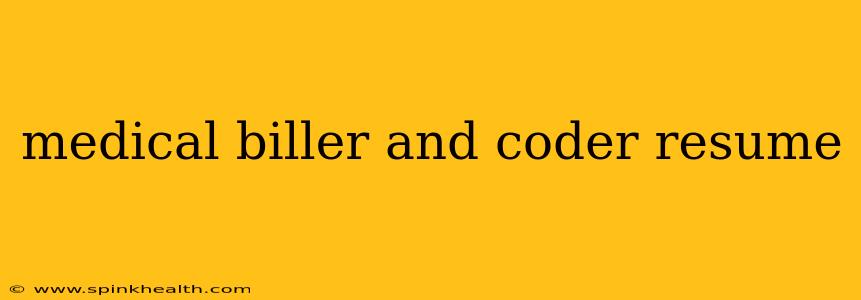Crafting the Perfect Medical Biller and Coder Resume: A Story of Success
Landing your dream job as a Medical Biller and Coder isn't just about possessing the skills; it's about showcasing them effectively. Think of your resume as your personal narrative, a compelling story that highlights your expertise and persuades potential employers you're the perfect fit. This isn't just a list of tasks; it's a demonstration of your value.
Let's embark on the journey of creating a resume that commands attention and opens doors to exciting opportunities. We'll address common questions and concerns, transforming your resume from a simple document into a powerful tool for career advancement.
H2: What are the most important skills to highlight on a medical biller and coder resume?
This is where your story begins. Imagine the hiring manager – they're sifting through dozens of resumes, each claiming proficiency in billing and coding. To stand out, you need to tell a story of impact. Don't just list "ICD-10 coding"; instead, quantify your accomplishments. For example, "Improved coding accuracy by 15% within six months, resulting in a reduction of denied claims by 10%." See the difference? This shows tangible results, demonstrating your value beyond just possessing the skills. Here are some key skills to highlight, focusing on quantifiable achievements whenever possible:
- Coding Proficiency: Specify your expertise in ICD-10, CPT, HCPCS, and any other relevant coding systems. Quantify your experience: "Coded over 5,000 patient charts with 99% accuracy."
- Billing Expertise: Detail your knowledge of insurance claim submission, denial management, and accounts receivable. Showcase your success in reducing outstanding balances or improving payment turnaround times.
- Electronic Health Records (EHR) Systems: List all EHR systems you're proficient in, highlighting your ability to navigate and extract information efficiently.
- Medical Terminology: This is essential. Demonstrate your strong grasp of medical terminology through your descriptions of responsibilities.
- Software Proficiency: Mention any billing or coding software you’ve mastered (e.g., EPIC, Cerner, Medisoft).
- Analytical Skills: Highlight your ability to identify and resolve coding discrepancies or billing errors.
- Communication Skills: Strong communication is crucial. Illustrate your ability to interact effectively with patients, physicians, and insurance companies.
H2: How do I tailor my resume to different job descriptions?
Every job description is unique. Treat your resume as a chameleon—adapting to match the specific requirements of each position. Carefully analyze the job posting, identifying key skills and requirements. Then, strategically tailor your resume to highlight those specific skills and experiences. Use keywords from the job description throughout your resume, ensuring a seamless match. This demonstrates your understanding of the role and your eagerness to contribute.
H2: What should I include in my resume summary/objective?
This is your elevator pitch – a concise summary that grabs the reader's attention immediately. Avoid generic statements. Instead, craft a powerful summary that showcases your key skills and accomplishments, directly relating them to the specific job you're targeting. For example, instead of "Seeking a Medical Biller and Coder position," try "Highly skilled and detail-oriented Medical Biller and Coder with 5+ years of experience in reducing claim denials by 12% and improving revenue cycle efficiency."
H2: How long should my resume be?
Aim for a one-page resume, particularly if you're early in your career. Focus on your most relevant and impactful experiences. If you have extensive experience, a two-page resume might be acceptable, but prioritize concise and impactful language to avoid overwhelming the reader.
H2: What kind of action verbs should I use?
Use strong action verbs to showcase your accomplishments. Avoid weak verbs like "responsible for" or "helped." Instead, use verbs like "managed," "analyzed," "implemented," "resolved," "improved," and "streamlined." These verbs demonstrate your initiative and results-oriented approach.
By following these steps, you’ll transform your resume into a powerful story that showcases your skills and experience, attracting the attention of potential employers and landing you that dream job. Remember, this is your opportunity to shine – make it count!

